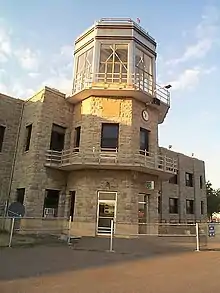Charles W. "Speed" Holman
Charles Willis "Speed" Holman (December 27, 1898 – May 17, 1931) was an American stunt pilot, barnstormer, wing walker, parachutist, airmail pilot, record-holding aviator, and airline pilot. Born in Bloomington, Minnesota, in 1926 he became the first pilot hired by Northwest Airways and later its first operations manager.[2] In 1928, Holman set a world's record of 1,433 consecutive loops in an airplane in five hours over the St. Paul Airport.[3]
Charles W. Holman | |
|---|---|
.jpg.webp) | |
| Born | Charles Willis Holman December 27, 1898 |
| Died | May 17, 1931 (aged 32) Omaha, Nebraska, US |
| Resting place | Acacia Park Cemetery Mendota Heights, Minnesota[1] |
Biography
He was born in Bloomington, Minnesota, on December 27, 1898.
In 1917 Holman raced motorcycles at the Minnesota State Fair, earning the nickname "Slim", and later, "Speed". In 1918, Holman offered to work as a mechanic in exchange for flying lessons with Walter Bullock. To earn money, he quickly added parachute jumps and wingwalking to his skills. In 1924 Holman won second place in the "on to Dayton" race. In 1926 he became an airmail pilot on the CAM-9 route from Minneapolis to Chicago, along with Matty Laird. In 1927 he won the New York to Spokane cross country air derby in a Laird commercial biplane.[4] CAM-9 was reorganized by William Bushnell Stout with several financiers to form Northwest Airlines, hiring Holman as its first pilot, later becoming its chief pilot.[5][6] Holman's first pilot's license, issued in 1927, was signed by Orville Wright.[7][8]
By 1929, Holman was a leading pilot for Northwest airlines, gaining more notoriety becoming the fourth person in the world to perform the outside loop, and first to do so in a commercial aircraft.[9] Holman became a major investor in the airline, buying $2,000 worth of stock.[10]
In 1930 Matty Laird was commissioned to build a racing plane based on the Laird Speedwing by B.F. Goodrich's Lee Schoenhair for the 1930 Thompson Trophy race. Schoenhair backed out of the project, believing the aircraft would not be tested in time. Laird entered the Laird Solution with Holman as the pilot only a few minutes after Holman flew the aircraft on its maiden flight. He won the race at average speed of 201.91 mph.[11]
Holman died at age 32 when his upside-down aircraft crashed on May 17, 1931, at the opening of an airport in Omaha, Nebraska, in front of 20,000 spectators. His funeral was one of the largest yet held in St. Paul.
Legacy

Holman Field, St. Paul Downtown Airport is named in honor of Speed Holman, as was Holman street in St. Paul, Minnesota.[12] Holman's Table, located at Holman Field, is also named in honor of the famed pilot. Holman is also inducted in the Minnesota Aviation Hall of Fame.
References
- Stew Thornley. Six Feet Under: A Graveyard Guide to Minnesota. p. 19.
- "He Belonged to the Heights and the Heights Claimed Him" (PDF). Contrails. No. 210. Retired Northwest Airlines Pilots' Association. February 2020. p. 11.
- (nd) Ask A Historian Archived 2012-06-03 at the Wayback Machine. Ramsey County Historical Society. Retrieved 5/31/07.
- "The National Air Races". Popular Aviation: 7. November 1927.
- Joe Christy; LeRoy Cook. American Aviation. p. 110.
- George Smedal (July 1931). "A tribute to Speed Holman". Popular Aviation.
- "Sporting license, Fédération Aéronautique Internationale, 1927. Charles W. Holman papers" (PDF). Minnesota Historical Society. Retrieved 25 October 2016.
- Williamson, Lori (April 15, 2011). "Charles W. Holman Collection Returns to Minnesota". Minnesota Historical Society. Retrieved 25 October 2016.
- Popular Aviation: 8. July 1929.
{{cite journal}}: Missing or empty|title=(help) - Robert B. Pile. Top Entrepreneurs and Their Businesses. p. 20.
- Ted West (September 1977). "The Solution". Flying Magazine.
- Donald Empson; Don Boxmeyer; Kathleen M. Vadnais. The Street Where You Live: A Guide to the Place Names of St. Paul. p. 130.